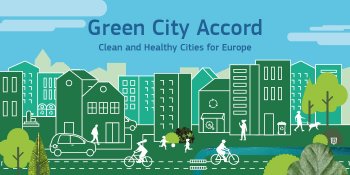
The Green City Accord is an ambitious movement of European cities committed to safeguarding the environment. Launched in October 2020 by the European Commission, the Accord invites city leaders to take further action to make their cities cleaner and healthier places to live. As of June 2021, 51 cities from across Europe have signed the Green City Accord.
Through this initiative, the European Commission offers cities networking and funding opportunities by facilitating closer communication between EU and local policy-makers. The Green City Accord aims to foster coherence with other EU city initiatives, bringing cities together for peer exchanges, providing access to expert advice, and sharing best-practice examples. It also enables cities to contribute to delivering the Zero-Pollution Ambition, the European Green Deal, the UN Sustainable Development Goals, and more.
The Green City Accord seeks to safeguard urban environments and improve citizens’ well-being by setting goals – and making significant progress – in five target areas: air, water, nature & biodiversity, circular economy & waste, and noise.
An integrated approach to protecting the environment
Over 70% of Europeans live in cities. It is therefore critical that local leaders confront the host of environmental challenges that put the health and well-being of their residents at risk.
Air pollution still exceeds EU standards in many cities. Meanwhile, rivers, lakes, and coastal waters remain under significant pressure. Noise pollution is on the increase. The availability of green spaces is challenged by urban sprawl, while inefficient waste management systems have a profound effect on the local environment.
As part of the Green City Accord, mayors and city leaders are committed to taking decisive action to ensure cleaner air and water, lower noise levels, and improved access to green spaces for their citizens. Overseeing a holistic transition to the circular economy will also nurture cities’ ability to confront future challenges by turning waste into a resource. A small set of mandatory indicators has been established to help cities define a baseline for their initiatives, but it is up to the cities themselves to develop innovative solutions that address the unique circumstances of their population and environment.
A focus on nature-based solutions
Many of these approaches focus on nature-based solutions. For example, Green City Accord signatory Lappeenranta (Finland), European Green Leaf Laureate 2021 and ICLEI Member, has constructed seven stormwater wetlands to act as a natural filter and reduce pressure on Lake Saimaa.
Meanwhile, Green City Accord signatory Vitoria-Gasteiz (Spain), European Green Capital 2012 and ICLEI Member, seeks to support local biodiversity and improve citizens’ access to green spaces through the Green Belt Project, building a series of peri-urban parks linked by eco-corridors throughout the city.
To learn more about the Green City Accord and how to join, please visit www.greencityaccord.eu or contact: contact@greencityaccord.eu
Eurocities, ICLEI Europe and CEMR are supporting the European Commission in developing and implementing the Accord.
Photo: Ignacio Brosa, Unsplash

